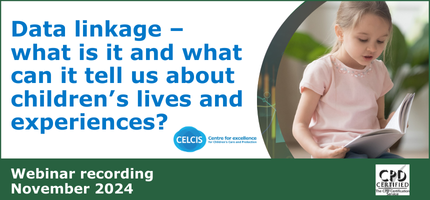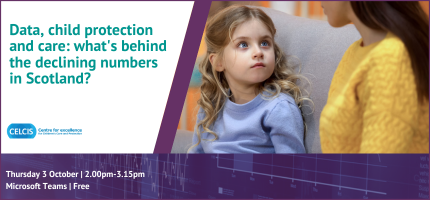
Data is an important resource that can give us insight into the wellbeing and experiences of children and young people in need of care and protection. It can tell us how services and systems are functioning for the children, young people and families they support, and what impact programmes of change are having. This can help practitioners to make informed decisions about children’s lives, and helps to support managers and leaders in their drive to improve practice and services.
CELCIS works together with individuals and organisations from across children’s services to build a greater understanding of the role of the data and respond to emerging data challenges. We take a lead role in gathering, analysing and applying data, research and evidence from Scotland, the UK, and internationally to improve services. That way, we can make the case to decision makers and partners for the sustained gathering and recording of better local and national data to ensure safe, positive, long-lasting change in the lives of children, young people and their families.
On this page, you can read more about our data work, find useful links and resources, and learn more about the Children's Care and Protection Data Community for Scotland, an online Community of Practice group launched by CELCIS in 2021, so that we can connect, reflect and learn together.
The Children's Care and Protection Data Community for Scotland
CELCIS currently facilitates a free, online Community of Practice group centred on data, The Children's Care and Protection Data Community for Scotland.
Data is an important resource that can be used to support and drive improvement in children's services. The Children's Care and Protection Data Community for Scotland brings people together to:
- Share best practice, ideas, experiences and learning on how to better collect, analyse and use data to improve the lives of Scotland's infants, children and young people in need of care and protection
- Reflect and learn together as a community
- Discuss recent findings relating to the use of data in children’s services
- Access news, information, blog posts, webinars, and other useful resources
- Meet and connect with colleagues in Scotland and further afield who are working in a similar space
Everyone with a role, remit and interest in data relating to children's care and protection is invited to become a member of the Community of Practice.
More information and instructions on how to join are available by clicking ‘Become a member’, or you can email carolann.anderson@strath.ac.uk with any questions.

Online resource: The Permanence and Care Excellence (PACE) programme
PACE was CELCIS’s national Quality Improvement programme. Taking place from 2014-2020, the programme supported 27 local authorities in Scotland to reduce timescales in providing a permanent home for babies, children and young people. This online resource brings together reports, recorded webinars and more to highlight how the use of data was collected, analysed and used to support change and improvement.
Recorded webinars
Online resource: Minimum Dataset for Child Protection Committees in Scotland
This online resource explains how Minimum Datasets are used by Child Protection Committees in Scotland and provides downloadable resources with recommended indicators and guidance.
Find out more about the Minimum Dataset
Blog post: Data matters - the role of Minimum Datasets in improving child protection processes
Since 2018, CELCIS has been working alongside three local public sector partnerships in Scotland to develop a Minimum Dataset for use across all 30 of Scotland’s Child Protection Committees. This blog post considers the practical issues around developing minimum datasets.





